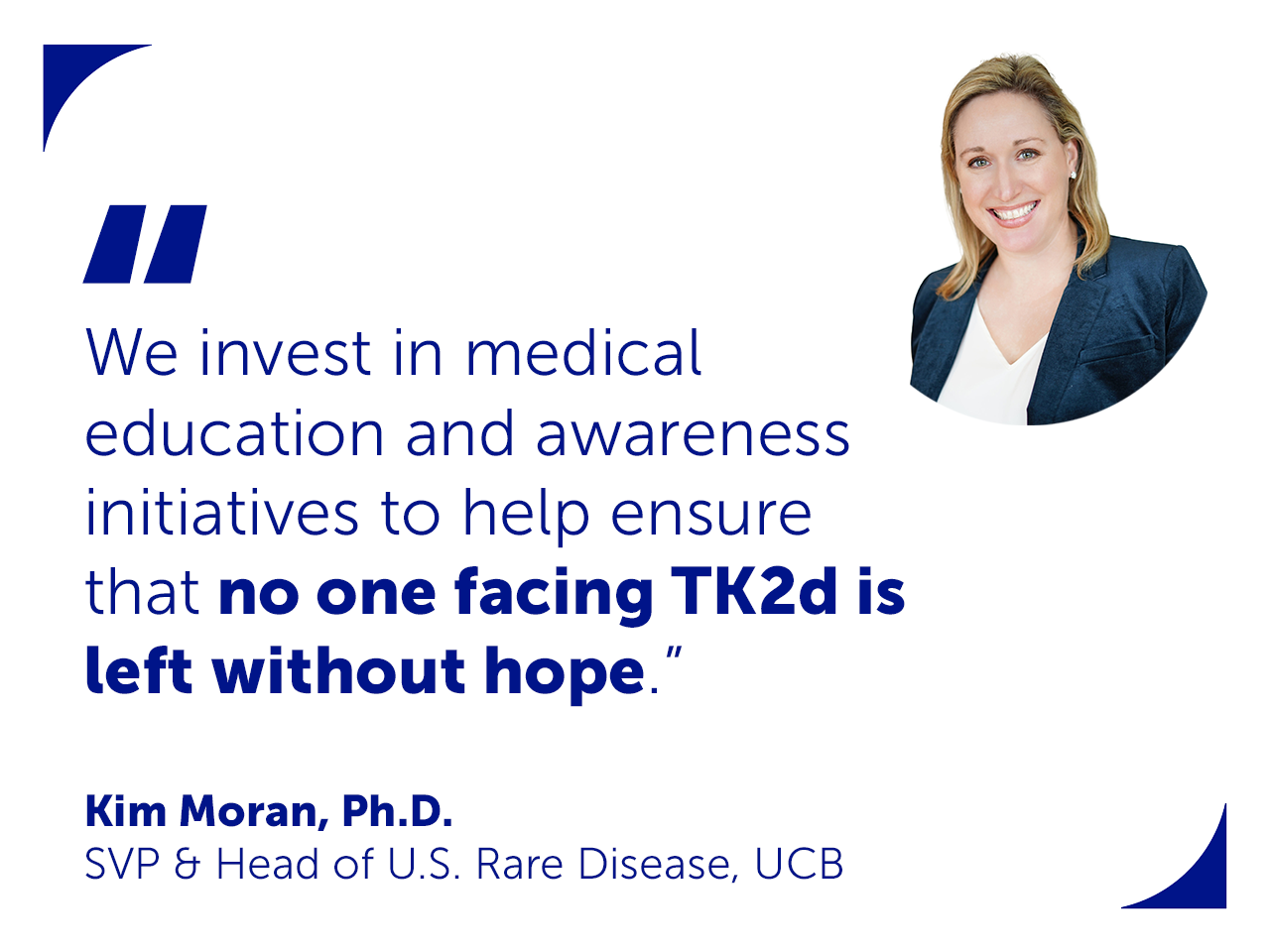
They deserve care, no matter how rare.
“Inspired by patients, driven by science” is all the more relevant right now to all of us at UCB, as we remain steadfast towards our commitment to developing differentiated treatments for people living with rare, and now ultra-rare, diseases.
This is especially the case for people living with thymidine kinase 2 deficiency (TK2d).
TK2d is an ultra-rare, life-threatening, autosomal recessive mitochondrial disease characterized by progressive and severe muscle weakness (myopathy) that can become worse over time and impact the ability to walk, eat and breathe independently.1,2,3
The development of UCB’s therapy for a subpopulation of patients with TK2d is a compelling example of deep scientific partnership: how scientific innovation and patient-centered design can converge to potentially address urgent medical needs. Central to this R&D journey is a long-standing collaboration with the scientific community such as Michio Hirano, MD, Chief of the Neuromuscular Medicine Division, Director of the Muscular Dystrophy Association (MDA) Clinic at Columbia University Irving Medical Center (CUIMC), and Director of the H. Houston Merritt Center for Muscular Dystrophy and Related Diseases, that pioneered early treatment approaches based on mouse models and administered therapy to the first TK2d patient in the US.
UCB’s development strategy—leveraging an open-label trial, retrospective literature, chart reviews, compassionate use, and expanded access programs—enabled early patient access while generating meaningful clinical data that supported regulatory approval. The TK2d story continues to evolve, but its foundation is clear: a relentless focus on patients, bold innovation in access pathways, and science-led partnership for patient impact.
Our commitment extends beyond treatment development. We invest in medical education and awareness initiatives to help ensure that no one facing TK2d is left without hope. By fostering a better understanding of this rare disease, we can improve patient outcomes and quality of life.
We continue to be inspired by the TK2d community we serve and the science we practice, to align our research activity with unmet needs.
References:
- Thymidine kinase 2 deficiency. National Organization for Rare Disorders. Updated September 14, 2022. https://rarediseases.org/rare-diseases/thymidine-kinase-2-deficiency/. Accessed May 2025.
- Domínguez-González C, et al. Collaborative model for diagnosis and treatment of very rare diseases: experience in Spain with thymidine kinase 2 deficiency. Orphanet J Rare Dis. 2021;16(1):407.
©2025 UCB, Inc., Smyrna, GA 30080. All rights reserved. US-MT-2500024
Choose Country
- Global Site – English
- Australia – English
- België – Engels
- Belgique – Anglais
- Brasil – Português
- България – Български
- Canada – English
- Canada – Français
- 中国 – 中文
- Česká Republika – Angličtina
- Danmark – Engelsk
- Deutschland – Deutsch
- France – Français
- España – Español
- Ελλάδα – Ελληνικά
- India – English
- Ireland – English
- Italia – Inglese
- 日本 – 日本語
- Казахстан – ағылшын тілі
- 한국 – 한국어
- Luxembourg – Anglais
- Luxemburg – Engels
- Magyarország – Angol
- México & Latinoamérica – Español
- Nederland – Engels
- New Zeeland – English
- Norge – Engelsk
- Österreich – Deutsch
- Polska – Polski
- Portugal – Inglês
- România – Engleză
- Россия – Русский
- Slovensko – Anglický
- Suomi – Englanti
- Sverige – Engelska
- Schweiz – Deutsch
- Suisse – Français
- Türkiye – Türkçe
- Україна – Англійська
- United Kingdom – English
- U.S.A. – English


